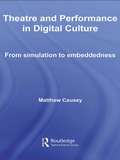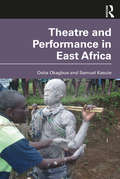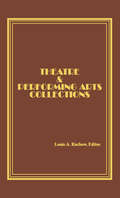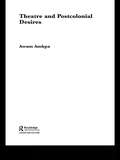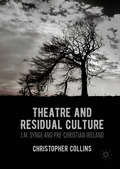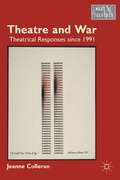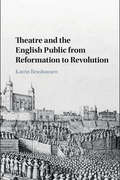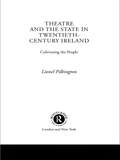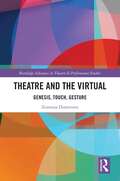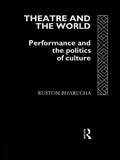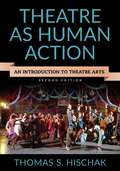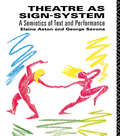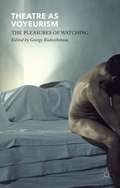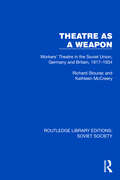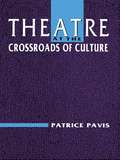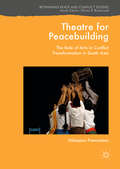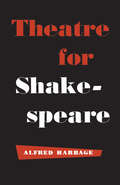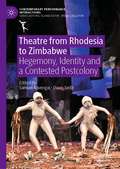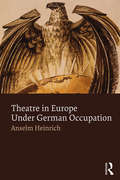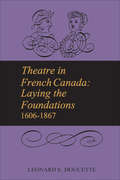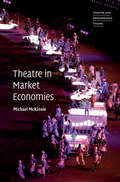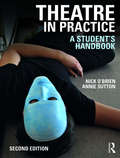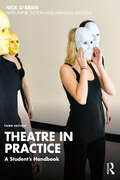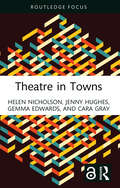- Table View
- List View
Theatre and Performance in Digital Culture: From Simulation to Embeddedness (Routledge Advances in Theatre & Performance Studies)
by Matthew CauseyTheatre and Performance in Digital Culture examines the recent history of advanced technologies, including new media, virtual environments, weapons systems and medical innovation, and considers how theatre, performance and culture at large have evolved within those systems. The book examines the two Iraq wars, 9/11 and the War on Terror through the lens of performance studies, and, drawing on the writings of Giorgio Agamben, Alain Badiou and Martin Heidegger, alongside the dramas of Beckett, Genet and Shakespeare, and the theatre of the Kantor, Foreman, Socíetas Raffaello Sanzio and the Wooster Group, the book positions theatre and performance in technoculture and articulates the processes of aesthetics, metaphysics and politics. This wide-ranging study reflects on how the theatre and performance have been challenged and extended within these new cultural phenomena.
Theatre and Performance in East Africa
by Osita Okagbue Samuel KasuleTheatre and Performance in East Africa looks at indigenous performances to unearth the aesthetic principles, sensibilities and critical framework that underpin African performance and theatre. The book develops new paradigms for thinking about African performance in general through the construction of a critical framework that addresses questions concerning performance particularities and coherences, challenging previous understandings. To this end, it establishes a common critical and theoretical framework for indigenous performance using case studies from East Africa that are also reflected elsewhere in the continent. This book will be of great interest to students and scholars of theatre and performance, especially those with an interest in the close relationship between theatre and performance with culture.
Theatre and Performing Arts Collections
by Lee AshHere is an exciting book that provides detailed descriptions of dozens of the most important and unique collections of “theatricana” in the United States and Canada. In Theatre and Performing Arts Collections, distinguished theatre specialists, librarians, and curators describe the unique possessions of the best and largest collections in theatre and performing arts. Each chapter provides detailed descriptions of the collections, as well as important notes about their history--information that is not available in any other source!
Theatre and Postcolonial Desires (Routledge Advances in Theatre & Performance Studies #No.1)
by Awam AmkpaThis book explores the themes of colonial encounters and postcolonial contests over identity, power and culture through the prism of theatre. The struggles it describes unfolded in two cultural settings separated by geography, but bound by history in a common web of colonial relations spun by the imperatives of European modernity. In post-imperial England, as in its former colony Nigeria, the colonial experience not only hybridized the process of national self-definition, but also provided dramatists with the language, imagery and frame of reference to narrate the dynamics of internal wars over culture and national destiny happening within their own societies. The author examines the works of prominent twentieth-century Nigerian and English dramatists such as Wole Soyinka, Femi Osofisan, Davd Edgar and Caryl Churchill to argue that dramaturgies of resistance in the contexts of both Nigerian as well as its imperial inventor England, shared a common allegiance to what he describes as postcolonial desires. That is, the aspiration to overcome the legacies of colonialism by imagining alternative universes anchored in democratic cultural pluralism. The plays and their histories serve as filters through which Ampka illustrates the operation of what he calls 'overlapping modernities' and reconfigures the notions of power and representation, citizenship and subjectivity, colonial and anticolonial nationalisms and postcoloniality. The dramatic works studied in this book embodied a version of postcolonial aspirations that the author conceptualises as transcending temporal locations to encompass varied moments of consciousness for progressive change, whether they happened during the hey day of English imperialism in early twentieth-century Nigeria, or in response to the exclusionary politics of the Conservative Party in Thatcherite England. Theatre and Postcolonial Desires will be essential reading for students and researchers in the areas of drama, postcolonial and cultural studies.
Theatre and Residual Culture: J.M. Synge and Pre-Christian Ireland
by Christopher CollinsThis book considers the cultural residue from pre-Christian Ireland in Synge’s plays and performances. By dramatising a residual culture in front of a predominantly modern and political Irish Catholic middle class audience, the book argues that Synge attempted to offer an alternative understanding of what it meant to be “modern” at the beginning of the twentieth century. The book draws extensively on Synge’s archive to demonstrate how pre-Christian residual culture informed not just how he wrote and staged pre-Christian beliefs, but also how he thought about an older, almost forgotten culture that Catholic Ireland desperately wanted to forget. Each of Synge’s plays is considered in an individual chapter, and they identify how Synge’s dramaturgy was informed by pre-Christian beliefs of animism, pantheism, folklore, superstition and magical ritual.
Theatre and Testimony in Shakespeare'S England
by Holger Schott SymeHolger Syme presents a radically new explanation for the theatre's importance in Shakespeare's time. He portrays early modern England as a culture of mediation, dominated by transactions in which one person stood in for another, giving voice to absent speakers or bringing past events to life. No art form related more immediately to this culture than the theatre. Arguing against the influential view that the period underwent a crisis of representation, Syme draws upon extensive archival research in the fields of law, demonology, historiography and science to trace a pervasive conviction that testimony and report, delivered by properly authorised figures, provided access to truth. Through detailed close readings of plays by Ben Jonson and William Shakespeare – in particular Volpone, Richard II and The Winter's Tale – and analyses of criminal trial procedures, the book constructs a revisionist account of the nature of representation on the early modern stage.
Theatre and War
by Jeanne ColleranHow has the media since the First Gulf War altered political analysis and how has this alteration has in turn affected socially-critical art? Colleran examines more than forty plays, many written in direct response to the 1991 war in Iraq as well as to the 9/11 attacks and the retaliatory actions in Iraq and Afghanistan.
Theatre and the English Public from Reformation to Revolution
by Katrin BeushausenThis book presents new and overarching perspectives on the relationship between theatre and public from the Henrician Reformation through the interregnum to the Restoration, combining vivid case studies with discussion of theatre's continued importance in shaping the early modern public. Considered from the vantage point of theatre, the early modern public becomes visible as an unruly agent of political change, a force that authorities both feared and appealed to, and one that proved ultimately beyond control. It was through theatrical strategies that rulers and their opposition addressed the early modern public, and in turn it was theatre's public potential that shaped the development of the stage during the revolutionary years of the seventeenth century.<P><P> In this volume, Katrin Beushausen examines sources including irreverent satirical pamphlets, regal spectacles, anti-theatrical polemic and visions of state theatres, casting new light on the development of the early modern public and theatre. <P> Sheds new light on the English Civil War and Commonwealth period, discussing theatre under prohibition and filling in important blanks in the history of the English stage.<P> Provides fresh insights into the literary and theatrical culture of the Interregnum, using theatre studies methodology to interpret numerous primary sources and case studies.<P> Charts the impact of theatre on the early modern public under different regimes from the early sixteenth century to the late seventeenth century.
Theatre and the State in Twentieth-Century Ireland: Cultivating the People
by Lionel PilkingtonThis major new study presents a political and cultural history of some of Ireland's key national theatre projects from the 1890s to the 1990s. Impressively wide-ranging in coverage, Theatre and the State in Twentieth-Century Ireland: Cultivating the People includes discussions on: *the politics of the Irish literary movement at the Abbey Theatre before and after political independence; *the role of a state-sponsored theatre for the post-1922 unionist government in Northern Ireland; *the convulsive effects of the Northern Ireland conflict on Irish theatre. Lionel Pilkington draws on a combination of archival research and critical readings of individual plays, covering works by J. M. Synge, Sean O'Casey, Lennox Robinson, T. C. Murray, George Shiels, Brian Friel, and Frank McGuinness. In its insistence on the details of history, this is a book important to anyone interested in Irish culture and politics in the twentieth century.
Theatre and the Virtual: Genesis, Touch, Gesture (Routledge Advances in Theatre & Performance Studies)
by Zornitsa DimitrovaTheatre and the Virtual lays out a set of conceptual instruments for the articulation and engendering of the forces of theatrical potentiality. Creating a passage toward a reconstitution of the given, a theatre of the virtual opens bodies in motion to a region of an ongoing genesis of forces. The outcome: regimes of constraint are abandoned through a radical practice of ecological attunement. Violence is eschewed through an onto-ecology of touch. Closed systems are repotentialised to become co-constitutive of their environments. A logic of spectrality settles in—not so much entities as atmospheres, not so much a being as a style of being, not so much a body as multitudinous milieus of response. This is the task of a theatre of the virtual—to safeguard the possibility of the extra-epistemological and uphold one’s right to offer accounts of oneself from outside of being, all the while creating a fractured record of the wondrous mutations of a moving, gesturing body. This book will be of great interest to students and scholars in theatre, philosophy, new materialisms, environmental humanities, gesture, and the ontology of response.
Theatre and the World: Performance and the Politics of Culture
by Rustom BharuchaIn this passionate and controversial work, director and critic Rustom Bharucha presents the first major critique of intercultural theatre from a 'Third World' perspective. Bharucha questions the assumptions underlying the theatrical visions of some of the twentieth century's most prominent theatre practitioners and theorists, including Antonin Artaud, Jerzsy Grotowski, and Peter Brook. He contends that Indian theatre has been grossly mythologised and taken out of context by Western directors and critics. And he presents a detailed dramaturgical analysis of what he describes as an intracultural theatre project, providing an alternative vision of the possibilities of true cultural pluralism. Theatre and the World bravely challenges much of today's 'multicultural' theatre movement. It will be vital reading for anyone interested in the creation or discussion of a truly non-Eurocentric world theatre.
Theatre as Human Action: An Introduction to Theatre Arts
by Thomas S. HischakMost introductory theatre textbooks are written for theatre majors and assume the student already has a considerable amount of knowledge on the subject. However, such textbooks may be counterproductive, because they reference several works that may be unfamiliar to students with limited exposure to theatre. Theatre as Human Action: An Introduction to Theatre Arts, Second Edition is designed for the college student who may be unacquainted with many plays and has seen a limited number of theatre productions. Focusing primarily on four plays, this textbook aims to inform the student about theatre arts, stimulate interest in the art form, lead to critical thinking about theatre, and prepare the student to be a more informed and critical theatregoer. <P><P>In addition to looking at both the theoretical and practical aspects of theatre arts—from the nature of theatre and drama to how it reflects society—the author also explains the processes that playwrights, actors, designers, directors, producers, and critics go through. The four plays central to this book are the tragedy Macbeth, the landmark African American drama A Raisin in the Sun, the contemporary rock musical Rent, and—new to this edition—the American comedy classic You Can’t Take It with You. At the beginning of the text, each play is described with plot synopses (and suggested video versions), and then these four representative works are referred to throughout the book. <P><P>This second edition also features revised chapters throughout, including expanded and updated material on the technical aspects of theatre, the role of the audience and critic,and the diversity of theatre today. Structured into nine chapters, each looking at a major area or artist—and concluding with the audience and the students themselves—the unique approach of Theatre as Human Action thoroughly addresses all of the major topics to be found in an introduction to theatre text.
Theatre as Sign System: A Semiotics of Text and Performance
by Elaine Aston George SavonaThis invaluable student handbook is the first detailed guide to explain in detail the relationship between the drama text and the theory and practice of drama in performance. Beginning at the beginning, with accessible explanations of the meanings and methods of semiotics, Theatre as Sign System addresses key drama texts and offers new and detailed information about the theories of performance.
Theatre as Voyeurism
by George RodosthenousTheatre as Voyeurism usefully (re)defines the notion of voyeurism as an 'exchange' between performers and audience members in contemporary theatre and performance. Pleasure (erotic and/or aesthetic) is here privileged as a crucial factor in the way meaning is produced in the encounter with a theatrical work. George Rodosthenous has drawn together an intriguing selection of authors and the ten chapters make a significant contribution to the overarching critical project of assessing the value of approaching theatre through – and as – voyeurism. The authors focus on a range of case studies including specific theatre artists such as Jan Fabre, Romeo Castellucci, Ann Liv Young, Olivier Dubois and Punchdrunk. This edited volume is therefore relevant to prospective readers interested in various aspects of visual experience in the theatre today.
Theatre as a Weapon: Workers' Theatre in the Soviet Union, Germany and Britain, 1917–1934 (Routledge Library Editions: Soviet Society)
by Richard Stourac Kathleen McCreeryBased on theatrical research of unusual depth and enterprise, Theatre as a Weapon (1986) shows how the workers’ theatre of the 1920s and 1930s transformed the social function of theatre. Drawing largely on unpublished sources, it provides lively case studies of workers’ theatre in the USSR, Germany and the United Kingdom. They range from the Russian mass spectacles in front of the Winter Palace, through the thousands of factory and courtyard performances in Germany, to the May Day activities of the Workers’ Theatre Movement all over Britain. The authors worked for many years in political theatre in Britain, Austria and Germany, and they draw on their wide experience to focus on both major theoretical controversies and their practical ramifications. They show how workers’ theatre became an instrument, a weapon, for political change, helping to raise the consciousness of thousands of workers and encouraging them to take action. They describe how worker-actors, musicians, writers and directors formed small, flexible troupes which contributed locally to the day-to-day struggles of their class, while at the same time participating in national and international political campaigns. Developments in dramatic structure are analysed, from the simple review form to the more complex scene-and-song montage. Placing the work of Meyerhold, Eisenstein, Piscator, Brecht and Eisler in this context, the authors demonstrate how the montage principle became the significant factor in the political theatre of this period. The book is illustrated with rare photographs which reflect the atmosphere of those mass movements. Unique in its coverage, Theatre as a Weapon is above all an analysis of how the mirror of realistic theatre was transformed into a dynamic weapon for social change. It fills an important gap in the history of working-class culture.
Theatre at the Crossroads of Culture
by Patrice PavisWestern culture has a long and fraught history of cultural appropriation, a history that has particular resonance within performance practice. Patrice Pavis asks what is at stake politically and aesthetically when cultures meet at the crossroads of theatre.? A series of major recent productions are analysed, including Peter Brook's Mahabharata, Cixous/Mnouchkine's Indiande, and Barba's Faust. These focus discussions on translation, appropriation, adaptation, cultural misunderstanding, and theatrical exploration. Never losing sight of the theatrical experience, Pavis confronts problems of colonialism, anthropology, and ethnography. This signals a radical movement away from the director and the word, towards the complex relationship between performance, performer, and spectator. Despite the problematic politics of cultural exchange in the theatre, interculturalism is not a one-sided process. Using the metaphor of the hourglass to discuss the transfer between source and target culture, Pavis asks what happens when the hourglass is turned upside down, when the `foreign' culture speaks for itself.
Theatre for Peacebuilding: The Role Of Arts In Conflict Transformation In South Asia (Rethinking Peace and Conflict Studies)
by Nilanjana PremaratnaThis book contributes to key debates in peacebuilding by exploring the role of theatre and art in general. Premaratna argues that the dialogical and multi-voiced nature of theatre is particularly suited to assisting societies coming to terms with conflict and opening up possibilities for conversation. These are important parts of the peacebuilding process. The book engages the conceptual links between theatre and peacebuilding and then offers an in-depth empirical exploration of how three South Asian theatre groups approach peacebuilding: Jana Karaliya in Sri Lanka, Jana Sanskriti in India, and Sarwanam in Nepal. The ensuing reflections offer insights that are relevant to both students and practitioners concerned with issues of peace and conflict.
Theatre for Shakespeare
by Alfred HarbageHere is a book to hearten playgoers, stimulate young actors, lead theatrical executives to reconsider methods of management, and encourage benefactors to open their wallets. In this new book (containing the Alexander Lectures for 1954-55), Mr. Harbage, distinguished critic and scholar, advocates a movement to give Shakespeare back to the audiences. He complains that, in greater or less degree, Shakespearean audiences are in constant danger of being bored, or more precisely of being "reverently unreceptive," of being gratified that they have come to the play and gratified that they then may go. In his opinion there is no theatre in the world today that can present Shakespeare with full adequacy. Mr. Harbage feels that Shakespearean production is at present lacking in a sense of direction, and needs some form of exemplary leadership. Counsels of perfection are required. There should be at least one company to set a standard, one not dependent upon immediate financial success, and one committed only to realizing artistic ideals worthy of the plays. The wholesome tendency to return to the original methods of production for guidance would be more effectual if a distinction were made between what is still applicable in those original methods and what is not. The author's argument is provocative and amusing throughout; it begins with detailed complaints and ends with detailed remedies. A generous amount of information about Elizabethan precedents and traditions is included. Alfred Harbage has published numerous books which have become cornerstones in Shakespearean scholarship: Annals of English Drama, 975-1700; Shakespeare's Audience; As They Liked It; and Shakespeare and the Rival Traditions. He has prepared new editions of The Tempest and As You Like it, is General Editor of the American Pelican Shakespeare, had published articles in learned journals, and has held editorial and advisory posts.
Theatre from Rhodesia to Zimbabwe: Hegemony, Identity and a Contested Postcolony (Contemporary Performance InterActions)
by Samuel Ravengai Owen SedaThe voices that are represented in this collection come from various parts of the world and express the views of practitioners and scholars who have all had first-hand experience working in Zimbabwean theatre from the last days of Rhodesia to Zimbabwe. The collection views the long continuum of developments in local theatre history as a case of the intrusive hegemonies that came with colonial Rhodesia as a conquest society, and localised identities in the form of the persistence of indigenous and syncretic popular forms. With time, all these came together to constitute the makings of a contested post-colony in contemporary theatre practice in Zimbabwe. The primary interest of scholars who are represented here is located at the intersection of political, cultural and performative discourses and the flow of Zimbabwean history. The focus, moreover, is not only on the history of performance cultures in postcolonial Zimbabwe - it extends its critical gaze to include the history of political ideas that gave rise to cultural contestation in the field of theatre and performance.
Theatre in Europe Under German Occupation
by Anselm HeinrichThe Second World War went beyond previous military conflicts. It was not only about specific geographical gains or economic goals, but also about the brutal and lasting reshaping of Europe as a whole. Theatre in Europe Under German Occupation explores the part that theatre played in the Nazi war effort. Using a case-study approach, it illustrates the crucial and heavily subsidised role of theatre as a cultural extension of the military machine, key to Nazi Germany’s total war doctrine. Covering theatres in Oslo, Riga, Lille, Lodz, Krakau, Warsaw, Prague, The Hague and Kiev, Anselm Heinrich looks at the history and context of their operation; the wider political, cultural and propagandistic implications in view of their function in wartime; and their legacies. Theatre in Europe Under German Occupation focuses for the first time on Nazi Germany’s attempts to control and shape the cultural sector in occupied territories, shedding new light on the importance of theatre for the regime’s military and political goals.
Theatre in French Canada: Laying the Foundations 1606-1867
by Leonard DoucetteIt is only recently that historians of the theatre in French Canada have turned their attention to playwrights active before the twentieth century. Their practice had been to trace the roots of theatre to mid-1930s, to the appearance of Father Emile Legault and his troupe, the Compagnons de Saint-Laurent, dismissing what had gone before. In this innovative history, Leonard Doucette sets out deal for the first time with all plays that have survived to 1867 and to link them with the evolution of politics, institutions, and culture in French Canada. The study of theatre has often been handicapped also by the outdated practice of defining the literary-cultural history of a nation by identifying the masterpieces produced in specific periods and then defining other works in terms of what they are not. The surprisingly rich and varied history of theatrical forms in French Canada has just begun to receive the attention it deserves from scholars. Some of the texts and authors referred to in this history are identified for the first time: the materials cited and conclusions drawn are based upon original research in major Canadian libraries as well as the works of published critics and historians. The result is an excellent introduction to the various forms theatre has taken and the problems it has encountered in French Canada.
Theatre in Market Economies (Theatre and Performance Theory)
by Michael McKinnieTheatre in Market Economies explores the complex relationship between theatre and the market economy since the 1990s. Bringing together research from the arts and social sciences, the book proposes that theatre has increasingly taken up the mission of the 'mixed economy' by seeking to combine economic efficiency with social security while promoting liberal democracy. McKinnie situates this analysis within a wider context, in which the welfare state's tools have been used to regulate, ever more closely, the lives of citizens rather than the operations of markets. In the process, the book invites us to think in new ways about longstanding economic and political problems in and through the theatre: the nature of industry, productivity, citizenship, security and economic confidence. Theatre in Market Economies depicts a theatre that is not only a familiar cultural institution but is, in unexpected and often ambiguous ways, an exemplary political-economic one as well.
Theatre in Practice: A Student's Handbook
by Nick O'Brien Annie SuttonTheatre in Practice is an accessible and wide-ranging exploration of the central practices and key practitioners covered on the various syllabi at A level, IB, BTEC and beyond. Exploring Stanislavski, Brecht, Artaud, Lecoq, Berkoff and Craig, as well as work from innovative theatre companies such as Complicite, Gecko and The Paper Birds, it combines an informal, unpretentious tone with a wealth of practical exercises. Revised and updated to meet the most recent post-16 and A level drama requirements and to include some of the latest practices in theatre, this new edition offers a step-by-step approach to developing key skills such as devising, improvising, rehearsing mono/duologues and directing plays. Written by specialists with extensive experience leading workshops for the post-16 age-group, Theatre in Practice is a thorough and imaginative resource that speaks directly to students. New for this edition: A new chapter exploring Artaud and how to use Artaud with text and when devising. A new chapter exploring the progression of practice from Lecoq to Complicite. A series of step-by-step exercises exploring the Gecko devising process. An exploration of the work of The Paper Birds and E G Craig when devising. New exercises on how to devise using Stanislavski and Brecht.
Theatre in Practice: A Student's Handbook
by Nick O'BrienTheatre in Practice, third edition, is an accessible and wide-ranging exploration of the central practices and key practitioners covered on the various syllabi at A level, IB, and at undergraduate level.Exploring Stanislavski, Brecht, Artaud, Lecoq, Berkoff, Bogart, Mitchell and Craig, as well as work from innovative theatre companies such as Tamasha, Sh!T Theatre, Complicite, Gecko and The Paper Birds, it combines an informal, unpretentious tone with a wealth of practical exercises. Revised and updated to include some of the latest practices in theatre, this new edition offers a step-by-step approach to developing key skills such as devising, improvising, rehearsing mono/duologues and directing plays.New for this edition are chapters from Nick O'Brien and Mikhaela Mahony on key female and global majority practitioners; a chapter offering a unique insight into the acting practice of award-winning actress Indira Varma; and updated information throughout.Written by specialists with extensive experience at post-16 and undergraduate level, Theatre in Practice is a thorough and imaginative resource that speaks directly to students and teachers. This book offers students a range of exercises to experience and explore key practitioners enabling them to understand theatre how it should be understood: through practice.
Theatre in Towns
by Gemma Edwards Helen Nicholson Jenny Hughes Cara GrayTheatre in Towns offers a contemporary perspective on the role of theatre in the cultural life of towns in England. Exploring volunteer-led, professional and community theatres, this book investigates the rich and diverse ways that theatres in towns serve their locality, negotiate their civic role, participate in networks of mutual aid and exchange, and connect audiences beyond their geographical borders. With a geographical focus on post-industrial, seaside, commuter and market towns in England, the book opens questions about how theatre shapes the narratives of town life, and how localism, networks and partnerships across and between towns contribute to living sustainably. Each chapter is critically and historically informed, drawing on original research in towns, including visits to performances and many conversations with townspeople, from theatre-makers, performers, set-builders, front-of-house volunteers, to audience members and civic leaders. Theatre in Towns asks urgent questions about how the relationships between towns and theatres can be redefined in new and equitable ways in the future. Theatre in Towns brings new research to scholars and students of theatre studies, cultural geography, cultural and social policy and political sociology. It will also interest artists, policy-makers and researchers wanting to develop their own and others’ understanding of the value of active theatre cultures in towns. The Open Access version of this book, available at www.taylorfrancis.com, has been made available under a Creative Commons Attribution-Non Commercial-No Derivatives 4.0 license.
